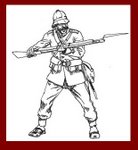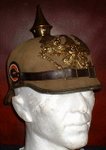

In 1914 L Battery rode into battle in support of 1st Cavalry Brigade as part of the British Expeditionary Force in the Great War. The greatest exploit in all it's history was to occur during the famous "Retreat from Mons" when the battery took part in an action, referred to as "The Affair at Néry", which was believed by many to be the turning point of that part of the 1st World War. During the action at the village of Néry, about 33 miles north-east of Paris, L Battery suffered heavy losses but fought bravely until the last gun had expended all it's ammunition and held the German 4th Cavalry Division at bay. Three Victoria Crosses were awarded to members of the battery for that action and the battery awarded the battle honor title Néry.
On the evening of 31 August 1914, the 1st Cavalry Brigade and L Battery bivouacked in the village of Néry. The horses were mostly picketed in enclosures inside the village, and those of L Battery, as usual, tied to long ropes stretched between the parked guns and ammunition wagons. Men and horses, tired from the long marches during the retreat from Mons, slept.
It had been intended to continue the retreat at 0430 hrs the next day, but a dense fog had formed during the night, so the move was postponed and units told to be ready at 0530hrs. The interval was used to water and feed the horses in rotation. There was a deep ravine to the east of the village and beyond, a plateau which overlooked the village. Unknown to the British, the German 4th Cavalry Division had spent the night just beyond the plateau, about two miles from Néry. German recce patrols discovered the British at first light. An immediate German attack from both flanks was ordered, to be supported by twelve guns firing from the plateau. A British cavalry patrol had in fact discovered the threat when the fog suddenly lifted and the whole village was swept by the fire of the German guns.
The effect was devastating, men and horses, mostly in the open and closely packed together, were shot down in swathes while the wounded horses broke loose and stampeded. The scene in L Battery lines was even more terrible. Being closest to the enemy on the east side of the village the Battery received the full weight of fire from the twelve guns at a range of eight hundred yards. As the frightened horses plunged in their harnesses, the poles of the limbers embedded themselves in the ground and the horses were pinioned as they were blown to pieces by the enemy fire.
The Battery Commander had been knocked unconscious by one of the first shells in the action. The Battery Captain, Captain EK Bradbury, and the subalterns were standing in a corner of the field when the action began and saw the Battery being shot to pieces in front of their eyes. Shouting for volunteers Bradbury raced for the guns followed by the subalterns, Sergeant D Nelson and some men and between them managed to unlimber three guns. Bradbury commanded one, Lt Gifford another and the third Lts Campbell and Munday took charge of. The ammunition had be brought through constant fire from twenty yards away and casualties began to mount. First Lt Campbell's gun had a direct hit before firing a round then Lt Giffords gun, after a few rounds, was hit with severe casualties and out of action. Bradbury's gun remained in action reinforced by some of the survivors and soon after Battery Sergeant Major GT Dorrell returning from watering the horses. The remain gun bore a charmed life and despite a constant flow of casualties, Bradbury kept in action against three hostile batteries under a thousand yards away. As the numbers dwindled Bradbury was mortally wounded bringing ammunition to the gun leaving a detachment of just BSM Dorrell and Sgt Nelson. As the available ammunition was expended the gun fell silent at last. This action allowed the 1st Cavalry Brigade to launch a counter attack forcing the Germans to retreat in disorder.
Hailed by many as the turning point in the war against the Kaiser, the action at Néry brought honour and recognition to the Battery as Bradbury, Dorrell and Nelson were awarded the Victoria Cross and the title L(Néry) Battery RHA bestowed on the battery. Captain EK Bradbury is buried in the village communal cemetery in Néry in a plot close to other fallen soldiers of the Battery, Sergeant D Nelson, he later achieved the rank of major and was killed in action at Lillers, France, on 8 April 1918 and BSM GT Dorrel died naturally in the UK around January 1971
Lt.Col. George Thomas Dorrell, V.C., M.B.E.L Battery, RHA Died 7th January 1971
This article describes the action of "L" Battery at Nery. Indeed, the then Battery Sergeant Major George Dorrell, was awarded one of the 3 V.Cs for the events of September 1st 1914.
George Thomas Dorrell was born in Paddington, London on 7th July 1880. He was 15 years old when he joined the Army, but he said "they put me down as 19". His later records show that he was 6ft tall, so it would probably not have been difficult to add a few years. By April 1905, he was a Sergeant in the R.H.A. at Lucknow, India, having taken a course on equitation, qualified as a Battery Rough Rider and being recommended for a course as a riding master. He was given very good reports in all aspects of his course, i.e. riding, swordsmanship, drilling and training remounts. By the outbreak of war in 1914 he would have been an experienced and highly trained gunner.
The artillery were taught that guns must be fought to the last, and that cavalry and infantry should be supported to the last possible moment, even if it meant the loss of the guns. This would have been second nature to George Dorrell, by now a Battery Sergeant Major, as he left for France in August 1914 with "L" Battery RHA. On the 24th August, during the retreat from Mons they held up a German attack near Quievrain by knocking out the German guns, stopping the attempt to outflank the left of the BEF and two days later they were in the great artillery duel at Le Cateau. By the 31st August the BEF had retreated behind the Aisne and "L" Battery, with the 1st Cavalry Brigade, was exhausted after fighting until 1600 hours. It must have come as a relief when they were told to bivouac at Nery, near the Oise, with orders to be ready to march at 0430 the following day.
Thinking that the nearby ridge was still held by the French and despite a warning from a local farmer that the Germans were advancing, the Brigade was instructed to settle down for the night. L Battery was positioned in an orchard south of the village and near the sugar factory. Opposite them, alongside a road that was in a deep cutting, were the 2nd. Dragoon Guards (Queen’s Bays.)
At 0230 hours on 1st September, the men of L Battery got up, rubbed down the horses, breakfasted, harnessed up and hooked in, ready to move at a moment’s notice. However, due to a thick mist they were told to stand fast until further notice. Sgt. Maj. Dorrell took the opportunity to water the horses, so the right half battery was taken a short distance away, to a pond behind the sugar factory, watered, brought back and hooked into the guns and wagons while the left half battery went off to water.
Meanwhile, in the mist, a patrol of the 11th Hussars had almost run into the German cavalry, but the alarm that they raised was too late. The French had pulled off the nearby ridge and been replaced by 10 German guns and 2 machine guns.
At 0540 hours a ranging shell smashed into "L" Battery, followed by shrapnel and machine gun bullets that caused havoc among the battery and the Bays, killing a number of men and bringing down about 150 horses. Capt. Edward Bradbury shouted "Come on, who’s for the guns!" as men raced to get the guns into position. Guns were damaged as horses bolted in panic, and one of them overturned on a steep bank. Only 3 could be unlimbered and manhandled into action and one of these soon had its spokes blown out while the second was hit and its whole detachment killed.
As the mist cleared, the last 13 pounder, capable of firing 15 rounds a minute, went into action. Gunner Darbyshire desperately fired for 20 minutes until concussion left him bleeding from his nose and ears. Lt. Campbell took over the firing position while the gunner supplied ammunition, but the lieutenant was blown off the gun and killed. Captain Bradbury, who had been acting as layer, had his leg blown off but carried on directing the firing until he died from his wounds, still propped against the side of the gun. Sergeant Major Dorrell had already taken over from Lt. Mundy who had been wounded, but now he took over command and with the dead and dying all around them, he and Sergeant Nelson kept firing until the last shot was brought up by Gunner Darbyshire and Driver Osborne. They had, in true artillery style kept their blood stained, battered, gun firing to the end and they had managed to silence the German guns. The action went down in regimental history as "Dorrell’s Duel" for by a quarter to nine in the morning the battle was over and the Germans had been given a distinct shock.
They had given 4th. Cavalry time to arrive on the scene, supported by "I" Battery R.H.A. and they were able to attack the Germans from the flank, capturing all but 4 of their guns.
Dorrell’s Victoria Cross, gazetted in November 1914, was one of the 3 awarded for L Battery’s historic stand at Nery, with one going to Sgt. Nelson and the other being a posthumous award to Capt. Bradbury. Before bringing what remained of his battery home to the U.K., the Battery Sergeant Major received a commission in the field, and later returned to France as battery commander of "A" battery, 119th Brigade RFA in the 38th (Welsh) Division.
He left the Army in 1921 as a Lieutenant Colonel and served with the Home Guard during the 2nd. World War. His heroic action was remembered in the regiment, and he was asked to inspect the Battery during the celebrations for Nery Day.
When he died at Stoke D’Abernon on January 7th 1971 he was 90 years old and is said to have "just faded away". He was survived by his sister, a son, two daughters and eight grandchildren. Although he had been long retired from the army, Lt. Col. Dorrell was accorded the honour that would have been given to a serving officer. He was given a regimental funeral with his coffin on a gun carriage escorted by King’s Troop RHA to the cemetery at Leatherhead and laid to rest as trumpeters played the Last Post.. His last journey was, as he would have wished it, as an old horse-artilleryman.































2 comments:
You gun bunnies are a brave lot....
Good posting. I enjoyed the read greatly.
Ian
Post a Comment